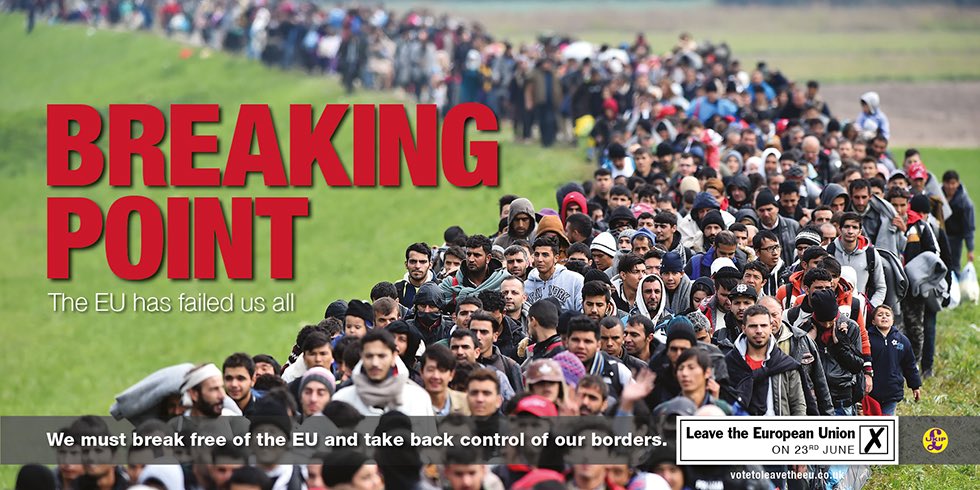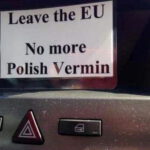Guest post by Dr. Robert Jackson
(Harper Award Winner and Emeritus Professor of Religions in Education at the University of Warwick, UK and Visiting Professor in the Department of Humanities and Social Sciences Education at the University of Stockholm, Sweden)
In the recent referendum of June 23, the slim majority in favour of the United Kingdom’s exit from the European Union did not result from democratic argument and exchange, based on accurate information about the key issues. It resulted from the well-organised and effective propagation of fear by politicians of the far right. Their message was especially directed at poorer members of society, whose economic uncertainties and lack of trust in the Westminster government were exploited. The deeply racist and xenophobic messages claiming that membership of the EU would result in the country being overrun by migrants and refugees was delivered daily by the right-wing tabloid press, reinforced by the ‘man of the people’ rhetoric and highly emotive visual images propagated by Nigel Farage, and his extreme right-wing United Kingdom Independence Party, UKIP. Opposition to them from Conservative Prime Minister David Cameron, and the Labour leader Jeremy Corbyn, was disappointingly weak and made little impact via the media. Cameron has resigned. There are strong calls for Corbyn’s resignation as Party Leader. Corbyn’s support for the Remain campaign was half-hearted and his contribution to the debate during the campaign was lamentable.
On 16 June, one week before the referendum on EU membership, the UKIP leader Nigel Farage published a poster showing thousands of refugees crossing into Slovenia from Croatia during the height of the migrant crisis in October 2015.

‘Breaking point’ is written in capital letters on the poster, and, ‘the EU has failed us all’ is written underneath. A line at the bottom of the poster reads: ‘We must break free of the EU and take back control of our borders’. The one white face on the poster is deliberately obscured by the banner saying ‘Leave the European Union on 23rd June’.
The reduction of arguments about membership of the EU to the propagation of fear about being overrun by refugees – presented as ‘other’ in ethnic as well as national terms – is a disgrace, but it was an effective tool for frightening a slim majority of the electorate, although not young people, to vote to leave. Boris Johnson and Michael Gove colluded with the racists of UKIP to achieve their goals.
Two days after the referendum result was declared, cards were left outside a school and delivered to the residences of Polish people in the town of Huntingdon bearing the message ‘Leave the EU: No more Polish Vermin’. Many more deeply racist and strongly offensive actions have followed. On 30 June, the police reported that over 300 hate crimes had been registered since the referendum result, over 5 times the usual weekly rate.

The use of racist propaganda, and its horrible effects at local levels, including stirring up fear and hatred, and causing deep distress to Polish friends, neighbours and colleagues, mirrors Nazi propaganda against the Jews and other minorities. For example, the Nazi film The Eternal Jew (1940) also portrays Jews as ‘vermin’. The UKIP poster and the anti-migrant propaganda exemplified above deliberately undermine and deny the concept of human dignity, which is fundamental to human rights and decency. The ‘Brexit’ vote has precipitated racist activity far beyond that influenced by Enoch Powell in his 1968 Rivers of Blood speech.
The Referendum and Human Rights
Although the issue was about membership of the European Union – essentially an economic as well as political institution – questions relating to human rights were always close to the surface. Yet the Remain campaign did not refer to human rights and to the post-Second World War activity which resulted in the formulation of the Universal Declaration of Human Rights, the establishment of the Council of Europe, and the drafting of the European Convention on Human Rights. UK Home Secretary Theresa May has stated her intention to pull Britain out of the European Convention on Human Rights – which would automatically remove the UK from membership of the Council of Europe, a crucially important human rights organisation with 47 member states, founded in 1949 under the Treaty of London, and deeply influenced by Winston Churchill. The Council of Europe’s educational programmes and materials, for example, are produced collaboratively by contributors from different parts of Europe, and address vital questions of living together in a modern world where pluralisation and globalisation are realities. Theresa May claims that the European Convention has done nothing to improve human rights in the UK. Britain, she says, does not need the rest of Europe in order to guarantee human rights, totally missing Winston Churchill’s point that it is international collaboration that is vital to the establishment and protection of human rights across the continent and beyond. [On 30th June, as part of her bid to be Prime Minister, Theresa May said that she would not pursue her bid to leave the European Convention, since it would not achieve sufficient political support from fellow MPs. One hopes that this remains the case]. Michael Gove, [having abandoned Boris Johnson on 30 June, his partner in fronting the racist Brexit campaign, and now a competitor with Theresa May for the Prime Ministerial role], would repeal the UK Human Rights Act and introduce a new ‘Bill of Rights’, aimed at restricting the rights enshrined in the European Convention which, ironically, was drafted by an Englishman, David Maxwell Fyfe, and supported wholeheartedly by Churchill. Right-wing newspapers, notably the Daily Mail, have maintained a consistently xenophobic and anti-European line throughout the campaign. On the day before the referendum the Daily Mail front page headline read:
‘Lies. Greedy elites. Or a great future outside a broken, dying Europe… If you believe in Britain vote Leave ’
The situation is deeply disturbing, but moderate voices across the main political parties are recognising the extreme danger of the situation, and much anger is being expressed at the outcome of a highly engineered referendum. Strong calls from many Labour supporters for Jeremy Corbyn’s resignation continue to appear daily, and he may not survive for much longer as leader. We can only hope that competent, moderate politicians supported by a much more politically aware and active general populace, will be mobilised.
Several decisions and actions of politicians have put personal political ends before any moral commitment to the electorate, to the people of Europe and to human dignity. We have seen the provision of a referendum by a Prime Minister attempting to appease the far right of his party, rather than staying with the structures and procedures of parliamentary democracy. We have seen the blatant use of racism and xenophobia by the leader of the far right UKIP party, tacitly supported by right-wing Conservative politicians such as Boris Johnson and Michael Gove, in order to achieve their goal of leaving the European Union by any means. We have seen the leader of the Labour Party avoid significant involvement in the Remain campaign through the national media for his own ideological purposes. We have seen right-wing newspapers such as the Daily Mail churning out much xenophobic propaganda, while showing no intention to set out the pros and cons of leaving the EU for the benefit of readers. The ‘Brexit’ campaign focused almost exclusively on fear of uncontrolled migration to the UK. From an ethical point of view, the whole process has been a disgrace. There continue to be calls for a second referendum and for the government not to accept the results of the referendum as binding. However, candidates for the Prime Ministership have not endorsed any of these protests.
Many people are shocked at the grassroots racist responses, fuelled by the propaganda from press and politicians, and many voices are speaking out for tolerance and respect for diversity. However, the experience of the referendum, and the events leading up to it, show the immense power of the popular media in controlling the selection and quality of information and in spreading alarm, and put a very large question mark by the idea of referenda as being a truly democratic way of making major political decisions in democracies which have Members of Parliament who have been elected to represent their constituents.
As one who loves Europe, and is deeply committed to the values and educational programmes of the Council of Europe, and to universal human rights, and with many other British people, I combine my grief and anger with a commitment to promote respect for human dignity, and collaboration and co-operation across Europe and beyond.
(images from The Telegraph, UK and Nigel Farage on twitter)